The recently released 2024 Global Risks Report focuses on the most serious risks we may face over the next decade, highlighting rapid technological change, economic uncertainty, global warming, and conflicts.
Let's discuss the problems the world will face in the 2-year and 10-year perspectives, how these problems may evolve over time, and potential preventive measures.
In this year's report, the highlighted problems can be examined under five main categories: economic, environmental, geopolitical, social, and technological. Some of the issues we are likely to feel the impact of most in the coming years from these categories are:
- Climate Change: Global warming and resulting changes in the Earth's system.
- Demographic Forking: Changes in the size, growth, and structure of the world's populations.
- Technological Acceleration: Issues arising from new technologies.
- Geostrategic Shift: Changes in the power of countries with material usage areas and dependence on new alternative raw materials.
Climate Change and Extreme Weather Events
While all these problems are significant, addressing the irreversible problem of Climate Change, and its impact on the private sector and civil society, is crucial.
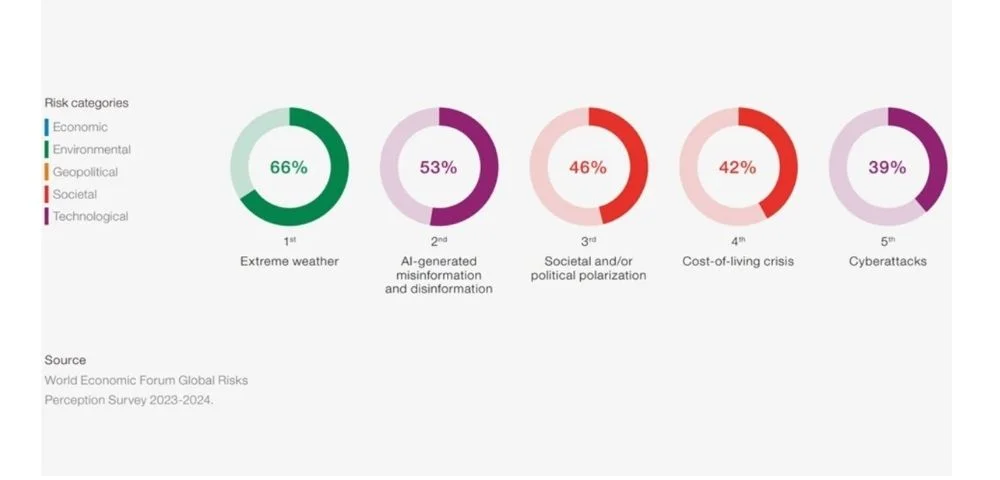
In the survey asking about the risks likely to cause a material crisis on a global scale in 2024, Extreme Weather events took the top spot with a 66% ranking. This result is not surprising considering the magnitude of damage caused by extreme weather events for both civilians and the private sector.
The estimated damage caused by extreme weather events between 2000-2020 is approximately $2.8 trillion. The survey results affirm that the effects of climate change are becoming increasingly tangible.
How Are Risks Ranked in the Short and Long Term?
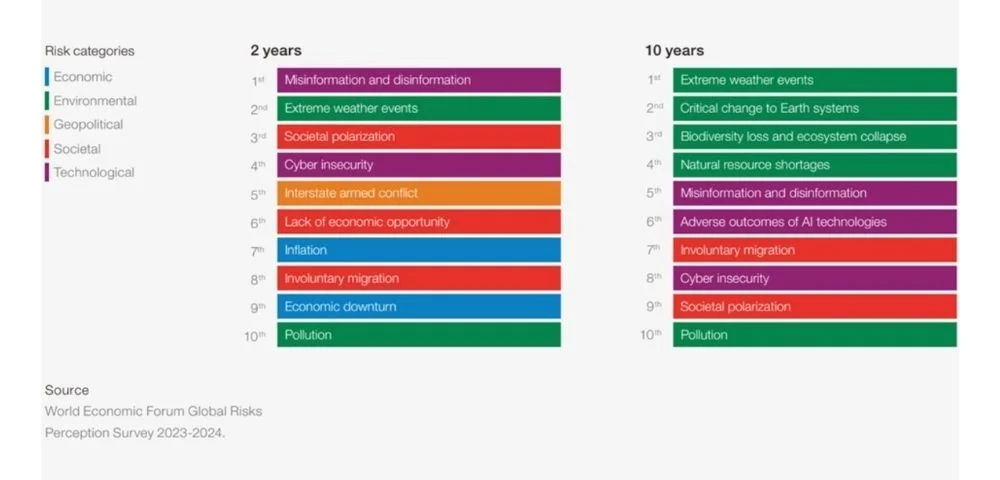
Survey participants disagree about the urgency of environmental risks, especially in terms of Biodiversity loss and ecosystem collapse and Critical change to Earth systems. Young participants tend to rank these risks much higher over the two-year period compared to older age groups, with both risks featuring in their short-term rankings.
While the private sector emphasizes these risks as long-term major concerns, participants from civil society or government prioritize these risks over shorter time frames. The dissonance in the perception of urgency among key decision-makers directly affects sub-optimal alignment and decision-making, potentially leading to missing key intervention points and causing long-term changes globally in the future.
Different Groups and Risks
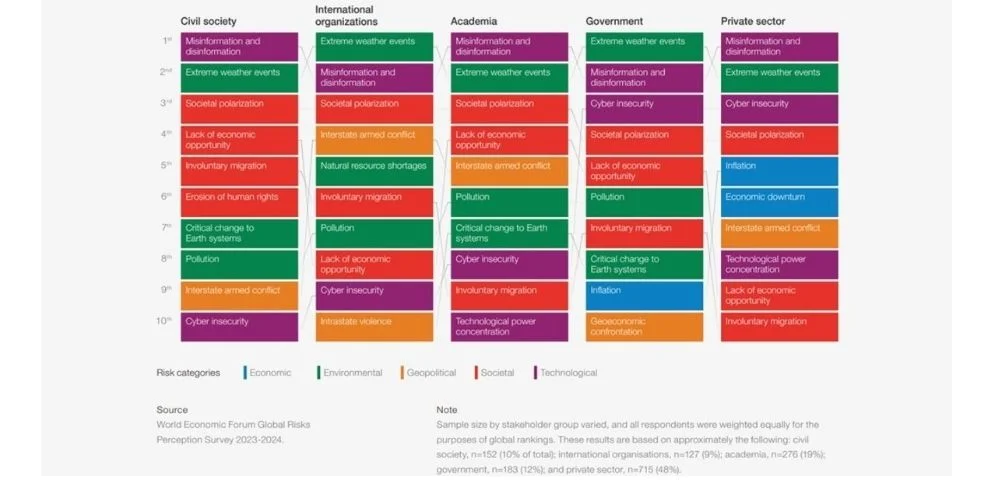
In the chart, regardless of the sample, the top two positions in the short term are always occupied. These are"Extreme Weather Events" and "Misinformation and disinformation."
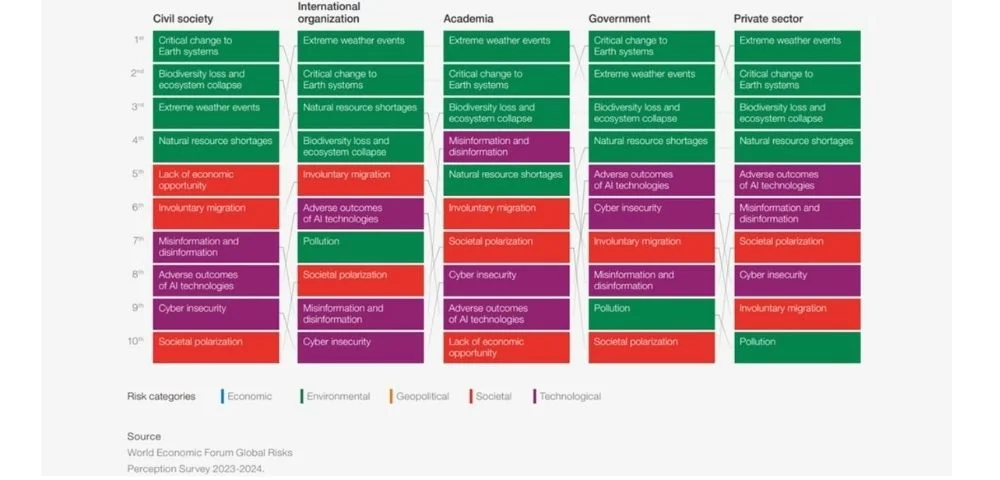
For each sample in participation, "Extreme Weather Events" and "Critical Changes to Earth Systems," which are directly linked to each. Have taken the top two positions, and for almost all samples, the first four positions seem to be in the environmental risks category. "Critical Changes to Earth Systems" is not only associated with environmental risks.
What Other Risks are Associated with Critical Changes to Earth Systems?
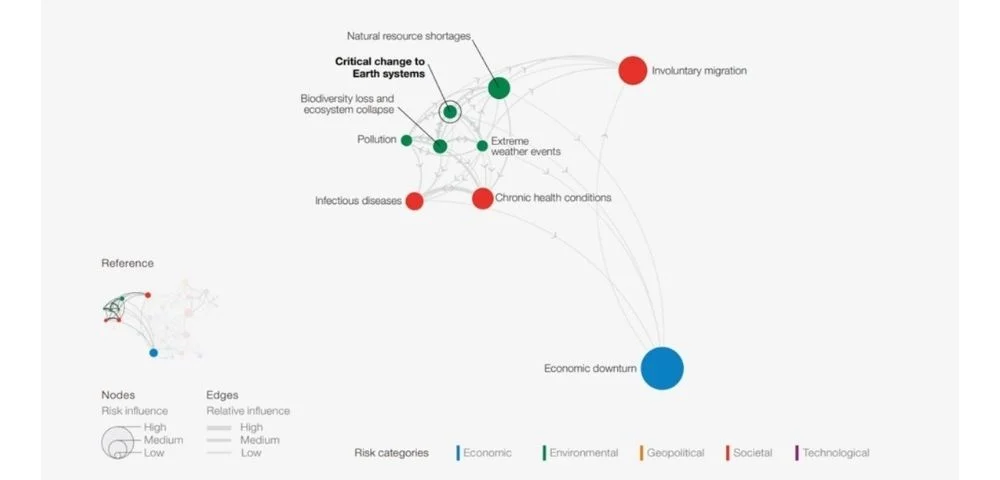
Addressing the risk of critical changes to Earth systems requires an evolved approach to climate risk management and decision-making. Climate models and economic modeling need improvement to fully consider the longer-term, non-linear, and cascading impacts of Earth system changes.
Around half of the survey respondents highlight the need for enhanced research and development regarding critical changes to Earth systems and adverse outcomes of frontier technologies, including geoengineering.
Conclusion
To address the risk of critical changes to Earth systems, we need to adopt a new approach to climate risk management and decision-making. Climate models effectively illustrate potential hazards, vulnerabilities, and exposures for decision-makers.
Their current limitations suggest that we are still entering uncharted territory. We can enhance climate and economic modeling by using more robust tools to analyze the entire planet. Enabling a longer-term perspective.
Developing early warning systems to minimize the material damages caused by extreme weather events is crucial. Accelerating the inevitable depletion of energy resources can be achieved by transitioning to clean energy sources.







